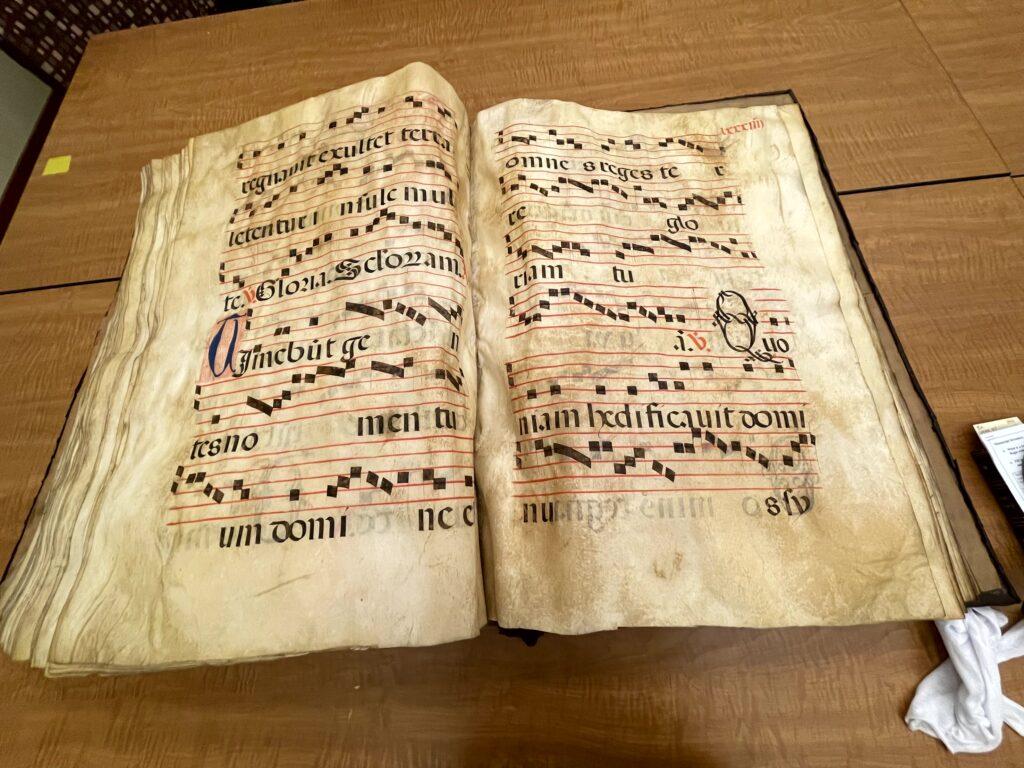
UMKC is one of multiple participants in a $2.5 million (Canadian) partnership grant from the Social Sciences and Humanities Research Council of Canada. Led by Dr. Jennifer Bain of Dalhousie University in Nova Scotia, the Digital Analysis of Chant Transmission (DACT) project aims to facilitate large-scale study of the development of plain chant (often termed Gregorian chant) after the European Middle Ages. Focusing on the movement of Latin liturgical chant beyond Europe into Indigenous and Settler communities, the project seeks to document sources through the digital platforms CANTUS Database and CANTUS Index.
Virginia Blanton, Curators’ Distinguished Professor of English, is co-applicant and will lead an international working group of musicologists, students, and volunteers to investigate Cantorales in the Americas and Beyond, which seeks to preserve data about chant books produced in the Spanish diaspora between 1350 and 1800. Blanton indicates that “there are a number of Spanish liturgical manuscripts in North, Central, and South America, many of which have never been catalogued, much less studied. Our group aims to make these resources known.” Such books are often very large manuscripts that were used by a choir in liturgical performance. There are two in LaBudde Special Collections at Miller Nichols Library, one donated by Conservatory alumnus James Adair and another saved by librarians who literally “passed the hat” to buy it from a Mission, Kansas frame shop, where it was being dismantled and sold leaf by leaf. “UMKC students have been hard at work investigating both of these manuscripts, providing inventories of the chant in them and researching their histories. The results of their multidisciplinary work are now preserved in the CANTUS Database,” Blanton said.
In developing learning opportunities for UMKC students, Blanton has collaborated with Bain at Dalhousie, as well as Dr. Debra Lacoste at the University of Waterloo, where the CANTUS platforms are maintained. When Blanton suggested that they might ask a group of musicologists to identify similar books for DACT, they asked her to lead the project into future discoveries. “Jennifer and Debra were so excited by the work UMKC students are doing—and by the mentorship I was providing. They emphasized that our collaborative model is the ideal scenario for the project I had suggested. Working with students on these books has been so rewarding, so I jumped at the chance.” The working group includes academic researchers from Spain, Guatemala, Australia, and North America, who will develop a crowd-sourcing document that will allow librarians and archivists, as well as musicians, Roman Catholic clergy, and nuns to share data about books in their collections. Largely, such books have been shelved since the early nineteenth century and forgotten. Their work aims to make digital entries for the resources they find so they can become known to the international community for future scholarship. Students will be a key part of that endeavor.
A group of seven UMKC student volunteers worked last year to trace manuscripts across the US, using print and digital indices. As Blanton notes, “We have only scratched the surface and have yielded over one hundred books. There are, most certainly, many more that have not been catalogued.” One, for example, Blanton found while visiting colleagues at Benedictine College to look at another manuscript. “It was such a lovely surprise but not a surprise,” she says. “Wherever I go, I learn about similar books and it seems important to document them and think about what they reveal about why these books were so important in the Americas. There is the dark side of this story—the history of colonization, in which Spaniards forced conversion of native peoples to Roman Catholicism—and there are fascinating results, such as books that illustrate how indigenous peoples adopted, transformed, and sustained chant in their native languages as well as in Latin. This revelation is at the heart of what we hope to understand as this project moves forward.” UMKC will receive $45,000 of the partnership grant to support student research over a three-year period. By studying the transmission of chant, the team will help uncover economic, social, cultural and intellectual values through the stories of chant manuscripts, and the human stories that accompany them.
The CODICES Digital Humanities Lab, founded by Blanton, Dr. Jeff Rydberg-Cox (English and Classics), and Dr. Nathan Oyler (Chemistry) in 2011, will provide imaging support for the Cantorales project. The Lab’s investigation of the Adair Chant Book is part of a current Digital Advancement Grant from the National Endowment for the Humanities, in which the team, along with colleagues Yugyung Lee (Computer Science) and Zhu Li (Computer Science), is using the palimpsests in the book as a testbed for an alternative deep learning model to multispectral imaging.

